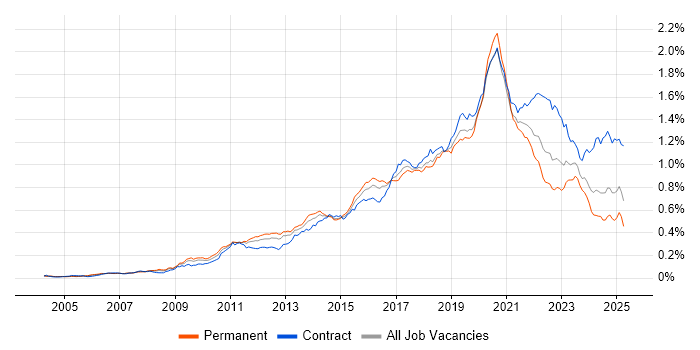Python Developer
UK > England
The median Python Developer salary in England is £76,000 per year, according to job vacancies posted during the 6 months leading to 26 February 2026.
The table below compares current salary benchmarking and summary statistics with the previous two years.
| 6 months to 26 Feb 2026 |
Same period 2025 | Same period 2024 | |
|---|---|---|---|
| Rank | 355 | 386 | 366 |
| Rank change year-on-year | +31 | -20 | +74 |
| Permanent jobs requiring a Python Developer | 309 | 290 | 468 |
| As % of all permanent jobs in England | 0.50% | 0.68% | 0.70% |
| As % of the Job Titles category | 0.55% | 0.74% | 0.74% |
| Number of salaries quoted | 248 | 200 | 437 |
| 10th Percentile | £50,000 | £51,125 | £52,500 |
| 25th Percentile | £60,000 | £57,188 | £66,250 |
| Median annual salary (50th Percentile) | £76,000 | £80,000 | £90,000 |
| Median % change year-on-year | -5.00% | -11.11% | +9.09% |
| 75th Percentile | £100,000 | £105,000 | £133,750 |
| 90th Percentile | £140,000 | £110,250 | £150,000 |
| UK median annual salary | £76,000 | £80,000 | £85,000 |
| % change year-on-year | -5.00% | -5.88% | +6.25% |
All Permanent IT Job Roles
England
For comparison with the information above, the following table provides summary statistics for all permanent IT job vacancies in England. Most job vacancies include a discernible job title that can be normalized. As such, the figures in the second row provide an indication of the number of permanent jobs in our overall sample.
| Permanent vacancies in England with a recognized job title | 56,218 | 39,052 | 62,857 |
| % of permanent jobs with a recognized job title | 91.45% | 91.19% | 94.59% |
| Number of salaries quoted | 36,340 | 21,134 | 50,106 |
| 10th Percentile | £29,500 | £32,750 | £28,823 |
| 25th Percentile | £38,500 | £45,000 | £39,750 |
| Median annual salary (50th Percentile) | £55,000 | £60,000 | £55,000 |
| Median % change year-on-year | -8.33% | +9.09% | -10.57% |
| 75th Percentile | £75,000 | £80,000 | £75,000 |
| 90th Percentile | £95,000 | £100,000 | £95,000 |
| UK median annual salary | £55,000 | £60,000 | £55,000 |
| % change year-on-year | -8.33% | +9.09% | -8.33% |
Python Developer
Job Vacancy Trend in England
Historical trend showing the proportion of permanent IT job postings featuring 'Python Developer' in the job title relative to all permanent IT jobs advertised in England.

Python Developer
Salary Trend in England
Salary distribution trend for Python Developer job vacancies in England.

Python Developer
Salary Histogram in England
Salary distribution for jobs citing Python Developer in England over the 6 months to 26 February 2026.
Python Developer
Job Locations in England
The table below looks at the demand and provides a guide to the median salaries quoted in IT jobs citing Python Developer within the England region over the 6 months to 26 February 2026. The 'Rank Change' column provides an indication of the change in demand within each location based on the same 6 month period last year.
| Location | Rank Change on Same Period Last Year |
Matching Permanent IT Job Ads |
Median Salary Past 6 Months |
Median Salary % Change on Same Period Last Year |
Live Jobs |
|---|---|---|---|---|---|
| London | +26 | 202 | £90,000 | +5.88% | 43 |
| North of England | +4 | 34 | £72,500 | +7.96% | 13 |
| Midlands | +21 | 31 | £65,000 | +18.18% | 2 |
| South East | +4 | 30 | £70,000 | +11.11% | 7 |
| Yorkshire | -21 | 25 | £75,000 | -9.09% | 10 |
| East Midlands | -20 | 17 | £65,000 | +18.18% | 1 |
| West Midlands | +30 | 14 | £75,000 | +28.42% | 1 |
| North West | -4 | 9 | £40,000 | -40.44% | 3 |
| South West | -12 | 7 | £55,000 | - | 5 |
| East of England | -5 | 1 | £50,000 | -41.18% | 2 |
| Python Developer UK |
|||||
Python Developer Skill Set
Top 30 Co-Occurring Skills & Capabilities in England
For the 6 months to 26 February 2026, Python Developer job roles required the following skills and capabilities in order of popularity. The figures indicate the absolute number of co-occurrences and as a proportion of all permanent job ads across the England region featuring Python Developer in the job title.
|
|
Python Developer Skill Set
Co-Occurring Skills & Capabilities in England by Category
The following tables expand on the one above by listing co-occurrences grouped by category. They cover the same employment type, locality and period, with up to 20 co-occurrences shown in each category:
|
|
||||||||||||||||||||||||||||||||||||||||||||||||||||||||||||||||||||||||||||||||||||||||||||||||||||||||||||||||||||||||||||||
|
|
||||||||||||||||||||||||||||||||||||||||||||||||||||||||||||||||||||||||||||||||||||||||||||||||||||||||||||||||||||||||||||||
|
|
||||||||||||||||||||||||||||||||||||||||||||||||||||||||||||||||||||||||||||||||||||||||||||||||||||||||||||||||||||||||||||||
|
|
||||||||||||||||||||||||||||||||||||||||||||||||||||||||||||||||||||||||||||||||||||||||||||||||||||||||||||||||||||||||||||||
|
|
||||||||||||||||||||||||||||||||||||||||||||||||||||||||||||||||||||||||||||||||||||||||||||||||||||||||||||||||||||||||||||||
|
|
||||||||||||||||||||||||||||||||||||||||||||||||||||||||||||||||||||||||||||||||||||||||||||||||||||||||||||||||||||||||||||||
|
|
||||||||||||||||||||||||||||||||||||||||||||||||||||||||||||||||||||||||||||||||||||||||||||||||||||||||||||||||||||||||||||||
|
|
||||||||||||||||||||||||||||||||||||||||||||||||||||||||||||||||||||||||||||||||||||||||||||||||||||||||||||||||||||||||||||||
|
|||||||||||||||||||||||||||||||||||||||||||||||||||||||||||||||||||||||||||||||||||||||||||||||||||||||||||||||||||||||||||||||
